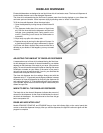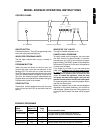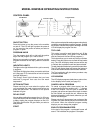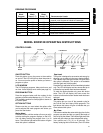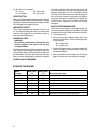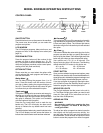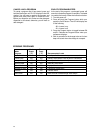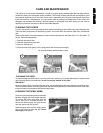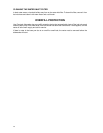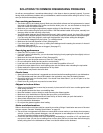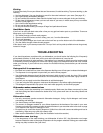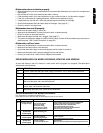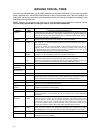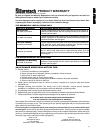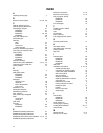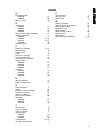30
Etching
If you have a cloudy film on your dishes that can’t be removed, it could be etching. To prevent etching, try the
following:
← Use less detergent. You may be using too much for the water hardness in your area. (See page 19.)
← Use a good quality dishwasher detergent.
← Do not overload the machine. Water should circulate freely to ensure adequate rinsing and draining.
← Fill the rinse aid dispenser (unless you have soft water in your area; in which case you may not need a
rinse aid.) (See page 20.)
← Use a lower water temperature setting.
← Do not use the Heat Dry option.
← Do not pre-rinse the dishes; just scrape off large food particles and bones.
Hard Water Spots
If you live in an area with hard water, after a time you may get hard water spots on your dishes. To remove
these spots, try the following:
1. Run dishes through a normal wash program.
2. Remove all metal dishware, such as cutlery, pans, etc., from the dishwasher.
3. Do not add detergent.
4. Pour two cups of vinegar into a bowl and set the bowl face up on the bottom rack of the dishwasher.
5. Run the dishes through a Normal wash program.
If this doesn’t work, try the same process with 1/4 cup of citric acid crystals (available at most drug stores)
instead of vinegar.
TROUBLESHOOTING
If you should experience a problem with your dishwasher, you should review the following list of frequently
encountered situations. It could save you the cost and inconvenience of a service call.
Even though the product is under warranty, if the problem is not caused by defective product workmanship
or materials, you will be charged for a service call. Refer to page 33 to determine what is and is not covered
under your warranty. If you’re still not sure, contact the Eurotech Advisory Center before you call a service
technician.
Detergent left in compartment
← Be careful not to load items so close to the dispenser that the cover will not open to release the detergent.
← The dispenser is not supposed to open when you use the Rinse program.
← Your dishwasher detergent should be fresh and stored tightly closed in a cool, dry place. Old or caked
detergent should be thrown away because it will not dissolve properly and will leave a gritty residue on
the dishware.
← Wait until you are ready to start the dishwasher to add the detergent.
← If you are using the Delay program, make sure the dispenser is dry before adding the detergent.
← The detergent compartment only opens in the main wash programs, not the Rinse program.
Dishwasher makes unusual noises
← This usually means that something is not loaded properly. Make sure the dishes are securely in place
and that nothing has fallen between the basket tines. Also, place small items in the cutlery basket and
close the lid.
Dishwasher leaks
← Use only unscented, granular automatic dishwasher detergent. Using a liquid detergent could cause
oversudsing and leakage.
← You should always use fresh detergent.
← The amount of detergent needed for your dishes depends on the hardness of the water in your area.
Contact your local utility company to learn the water hardness in your area then refer to the chart on page
19 to determine the amount of detergent to use.
← Be careful not to overfill the rinse aid dispenser. Spilled rinse aid could cause oversudsing and lead to
overflowing. Wipe away any spills with a damp cloth.
← Make sure the dishwasher is level. (See the Installation Instructions section.)
Dishwasher runs too long
← If the temperature of the water entering your dishwasher is below 120°, the dishwasher runs longer
because it heats the water to the proper temperature for the program selected. Raising your water heater
setting may help to shorten the cycle times.



